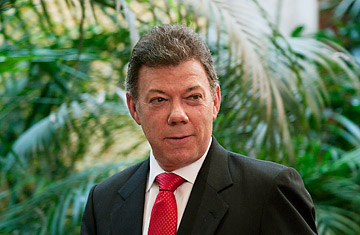
Juan Manuel Santos, President of Colombia
(2 of 2)
In Latin America, there's a history of counterinsurgency strategies — in Chile, in Peru, in Argentina — that have come to be viewed as excessive. How do you think history will view Plan Colombia?
I would say that history will single out Plan Colombia as the most successful bipartisan foreign-policy initiative that the United States launched in recent history. Colombia 10 years ago was a failed state — today it's a vibrant democracy. You couldn't have it better. The success of Plan Colombia, you can see it every day. And I think you should be proud of that, and we are proud of that.
How are your relations with Venezuela and President Hugo Chávez? And how are things going with the Latin left?
When I was in my campaign, I said, "Listen, I am going to have a responsibility as head of state." So I said, "Reach out," and he finally answered positively. I told him, "You're not going to convince me to think like you do, and I'm not going to convince you to think like I do. But let's respect our differences." And that's what we are doing, and the path that we agreed to is the correct path. Before, it was an absurd situation. For example, inflation there is over 30%. They had no food, and we have an oversupply of food. I am a part of the group of people who think that the traditional concept of left and right is a bit outdated. I see Cuba going on a path similar to Vietnam: economic liberalization and single-party rule. We are more than willing to help in this process, a transition that could be acceptable and positive for everybody.
Your predecessor was frustrated about not being able to get a free-trade agreement through the U.S. Congress. What are your thoughts?
It's in the hands of Congress. The U.S. government knows very well that for us it's very important. Today, it's a rather irrational situation where our goods are coming into the U.S. market with no tariffs. And your goods are coming into our market with tariffs. And you're the ones who are saying no to a free-trade agreement. Is that what you want? It doesn't make a lot of sense. We want a more mature relationship, instead of simply being recipients of aid. We want to play a more important role in the region. Colombia in a couple years will be the third most important country in Latin America. We will surpass Argentina. We'll have Mexico, Brazil and Colombia. Colombia has had a tradition with the U.S. of a strong alliance. We can work with the U.S. in areas like climate change. We are the richest country in the whole planet in biodiversity per square meter. We are the third richest country in the world in water. We want to change the agenda. We want the social agenda to be a priority, with other issues besides drug trafficking and violence.
As you look at American drug policy from afar, do you sometimes wonder if the U.S. has got its drug policy correct?
I will answer that with another question: Can you imagine what I am going to say to peasants in Colombia who grow marijuana if the referendum in California is approved? Is there not a tremendous contradiction and paradox? This is a situation that we're going to have to sit down and review with maturity. Because it'd be very difficult for you, the U.S., to continue saying that the war on drugs is marvelous — "but for my richest state, it's legal to produce and consume." If you can explain that to me, I will bow.
